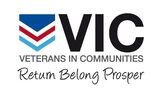East Lancashire
Veterans In Communities (VIC) works across East Lancashire to support those who have served in any of the branches of the Armed Forces, Emergency Services and their families.
We offer a range of activities which are run by veterans or retired members of the emergency services. The range of activities include;
Our Peer Support activities and projects are being delivered by veterans for veterans. Our community projects, outdoor activities and outreach services have been designed and developed by VIC members who understand the needs of veterans. Although many of our members have served in the Armed Forces or Emergency Services or have an association with the Armed Forces through family, VIC is not exclusive to veterans, and many of our Peer Support activities include those who haven't served. Our members are an integral element of VIC.
We offer a range of activities which are run by veterans or retired members of the emergency services. The range of activities include;
- Walking and outdoor activities.
- Horticulture and allotment.
- Social Inclusion trips.
- Helping the local community with small projects.
- Training opportunities,
- Veterans Outreach and Information Services.
- Art groups.
- Craft group.
- VIC Choir.
- Veterans In Production.
Our Peer Support activities and projects are being delivered by veterans for veterans. Our community projects, outdoor activities and outreach services have been designed and developed by VIC members who understand the needs of veterans. Although many of our members have served in the Armed Forces or Emergency Services or have an association with the Armed Forces through family, VIC is not exclusive to veterans, and many of our Peer Support activities include those who haven't served. Our members are an integral element of VIC.
EAST Lancashire areas
A selection of areas we cover:
Hyndburn |
|
Ribble valley |
|
Pendle |
|
Burnley |
|
Rossendale |
|
The Armed Forces Covenant
VIC sit on the board of two of the Armed Forces Covenants in East Lancashire; Pendle Armed Forces Group and Burnley.
The purpose of these regular meetings are to bring together the Local Authorities, third sector armed forces groups and charities, health representatives from the local area and other organisations who are involved in working with veterans.
‘The Armed Forces Covenant sets out the relationship between the nation, the government and the armed forces. It recognises that the whole nation has a moral obligation to members of the armed forces and their families, and it establishes how they should expect to be treated.
The covenant’s 2 principles are that:
The purpose of these regular meetings are to bring together the Local Authorities, third sector armed forces groups and charities, health representatives from the local area and other organisations who are involved in working with veterans.
‘The Armed Forces Covenant sets out the relationship between the nation, the government and the armed forces. It recognises that the whole nation has a moral obligation to members of the armed forces and their families, and it establishes how they should expect to be treated.
The covenant’s 2 principles are that:
- the armed forces community should not face disadvantage compared to other citizens in the provision of public and commercial services.
- special consideration is appropriate in some cases, especially for those who have given most such as the injured and the bereaved.
Veterans Priority Treatment
|
The Military Covenant is an agreement between the Armed Forces Community, the Government and Nation. On November 3rd 2011 The Military Covenant was enshrined in Law and put into the Armed Forces Act.
What this means to the health professional is that they need to offer ex-service personnel (Veterans) 'Priority Treatment'. In simple terms this means that if a veteran is suffering from a health condition that can be attributed to their military service then they should be given priority treatment. However to prioritise, this does not mean they would jump to the front of the queue. If people already have a clear clinical need they should be prioritised, but if those waiting have an equal clinical need then the veteran should take priority. |







